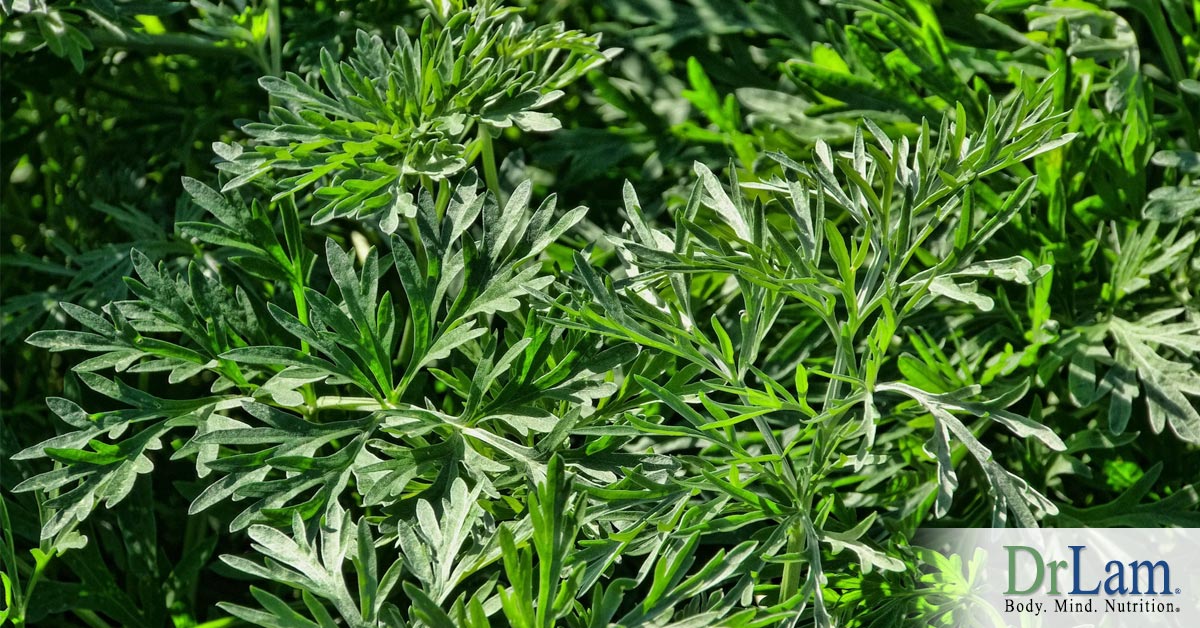Super-herb Artemisinin kills cancer cells, yeasts, parasites, pathogens like E coli, and viruses.
Artemisinin annua, or Sweet Wormwood, is a herb found from Pakistan to China, and is the current treatment of choice for malaria. The highest concentration of active ingredient is found in the leaves and flowers. There are 14 other Artemisia species.
1. Artemisinin is the most potent anti-malarial treatment available
Malaria kills at least 1 million people across the world each year. Artemisia annua, or sweet wormwood, is the most effective treatment, especially as the potency of certain drugs has continued to fail. The exact understanding of how it works is not fully clear but it seem to attack the membranes of the malarial mitochondria(1).
2. Artemisinin can deal with yeast infection effectively
Infections and excesses of yeasts are common in humans in the West. Some 70 per cent of human have excesses at some point in their lives. Excesses are caused when the commensal bacteria of the gut (the good guys) are compromised and fail to deal with the yeasts. At night in a healthy individual, 2.2 pounds of yeasts are consumed by commensal bacteria. Without their presence, the yeasts can flourish. They can punch holes in the gut wall (Leaky Gut Syndrome) allowing food molecules into the blood stream. In worse cases the yeasts can get into the blood stream, blocking cell receptor sites and colonising certain areas of the body.
These helpful bacteria can be damaged and their numbers reduced, by antibiotics and drugs (especially Proton Pump Inhibitors).
They can also be damaged by changing the pH of the gut – through consuming too much sugar, salt, pickled food or alcohol. The most damaging effects come from stress.
Wormwood seems to act in two ways against yeasts(2). As above, it attacks the mitochondrial membrane by producing free-radicals. It also interferes with ATP-dependent calcium transporters in the mitochondria. Artemisinin is very effective at killing yeasts, typically it can be used to treat excesses of Candida albicans in humans(3). Typical symptoms of yeast infestations include bloating, flatulence, gut problems, thrush, cystitis, mouth ulcers, night sweats and more. See our best seller, ‘The Secret Source of your Good Health’ by Chris Woollams.
Artemisinin can be effective in treating IBS, Crohn’s and Small Intestine Bacterial Overgrowth, or SIBO, the underlying cause of fibromyalgia, for example.
3. Artemisinin kills parasites
Firstly, artemesia annua is very effective at killing a group of blood flukes or Schistomas. These are the second most common parasite in the world after malaria. They are Trematodes. Later it was discovered that all trematodes can be killed by artemisinin(4). Pinworms, roundworms and more.
4. Artemisinin kills E. Coli and other pathogens
When killing parasites, artemisinin seems to act on about 124 different targets(5). It is actually a super-herb. It acts in so many ways.
One of artemisia annua’s properties is its sesquiterpines, which play a huge role in human health. They reduce inflammation and tumour formation(6). Some are anti-microbial and disrupt the cell walls of funghi and invasive bacteria.
E.coli has now been found present in breast cancer and colon cancer tissue. So the above antimicrobial action makes artemisinin a potent cancer preventer. And research has shown artemisinin does kill microbes from E.Coli to Salmonella(7).
5. Artemisinin kills cancer cells
However, there is clear research that artemisinin kills cancer cells on its own or especially when bound to iron(8). Cancer cells love iron and so ingest the iron-artemisinin mix. When bound to iron artemisinin is 34,000 times more effective at killing cancer cells! And according to studies published in journals like Life Sciences, Cancer Letters and Anticancer Drugs, wormwood can kill off cancer cells at a rate of 12,000 cancer cells for every healthy cell on its own.
On its own, artemisinin in the form of artesunate, was used in 2015 in a preliminary 20-person, double blind, randomised clinical trial by Dr. Sanjeev Krishna and a team from St. George´s London. The group taking artesunate had far larger numbers of colorectal cancer cell deaths and were fat more likely to survive to month 42 when the follow up was completed. A clinical trial with Colorectal cancer patients is now underway.
Professor Han-Ming Shen at the University of Singapore has also shown an effect for artemisinin with colorectal cancer. In a second stage of research, they further enhanced artemisinin´s activity with Alpha Lipoic Acid (ALA). Artemisinin and ALA together killed even more colorectal cancer cells while having no effect on healthy cells. Liver cancer is the next cancer to be studied.
Go To: Artemisinin bound to iron effective against cancer
Since many cancers are precursored by gut problems, long-courses of antibiotics, or drugs for recurrent illnesses, artemisinin is always a herb to consider.
6. Artemisinin usage and side-effects
Wormwood is powerful stuff, and should only be used in short bursts and rarely for more than 4 weeks at a time, although anti-malarial doses have shown few side-effects. Go To: Side-effects of Artemisinin
References
1.http://journals.plos.org/plosgenetics/article?id=10.1371/journal.pgen.0010036
2.onlinelibrary.wiley.com/doi/10.1111/j.1567-1364.2010.00706.x/pdf
3 https://www.ncbi.nlm.nih.gov/pubmed/12624823
4.Keiser J, Utzinger J (2007). “Artemisinins and synthetic trioxolanes in the treatment of helminth infections”. Current Opinion in Infectious Diseases. 20 (6): 605–612
5.http://cen.acs.org/articles/94/i1/Well-Known-Malaria-Drug-Artemisinin.html
6.https://www.ncbi.nlm.nih.gov/pmc/articles/PMC3709812/
7.http://pubs.acs.org/doi/abs/10.1021/jf060123o
8./cancer-active-page-link.aspx?n=3702
